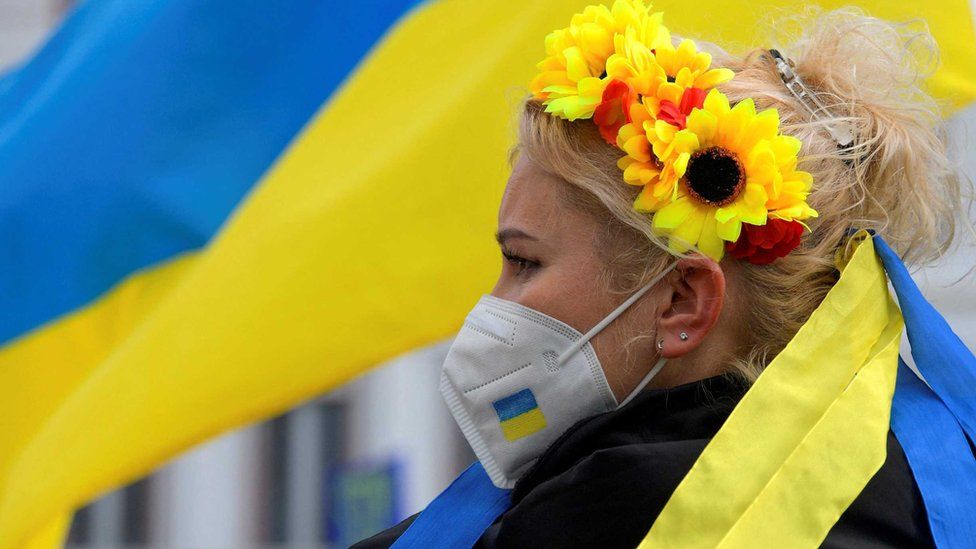
Some people noticed coverage in general was more sympathetic to Ukrainians than other migrant groups, said the study
By Emma Saunders
Culture reporter
A review into the BBC’s migration coverage has found while there is no consistent bias towards one viewpoint, there are risks to impartiality.
Commissioned by the BBC board, in April 2023, Dr Madeline Sumption’s review found while the BBC “produces a lot of excellent content on migration… there are also weaknesses”.
There were “risks to impartiality that point in multiple directions”.
And it “often tells migration stories through a narrow political lens”.
‘More context’
The review, focused on news and current affairs, also suggested coverage sometimes sought narrow “balance” by quoting soundbites from people with opposing views, while audiences wanted greater depth.
Viewers and listeners needed more context and explanation around complex policies such as sending asylum seekers to Rwanda, it found.
Journalists were sometimes anxious about taking on topics they felt could be hostile to migrants – even though these issues could be investigated while also being respectful towards the people involved and subjects such as immigration fraud covered “in a factual and nuanced way, without demonising migrants”.
And by focusing primarily on political developments, the BBC could overlook concerns such as how migration affected communities, housing, public services and the labour market.
‘Public’s views’
“BBC coverage should have equal empathy for migrants and UK residents who worry about the impacts of migration,” Dr Sumption wrote.
The UK public’s views on migration “run the gamut from deeply sceptical to very liberal”, her review said.
“But audiences generally recognised that migration brings both benefits and challenges.
“The BBC should reflect this nuance and not just the strongest views on either side”.
Dr Sumption spoke to more than 100 people, including journalists and experts, inside and outside the BBC, and 17 focus groups.
Many felt the coverage was largely negative, framing migration as a problem, with positives, such as migrants’ contributions to the labour market – as well as the challenges – under-reported.
They often wanted more international context and answers to questions such as “Is the UK a ‘disproportionately’ popular destination for migrants and asylum seekers?”
And some had noticed the coverage was more sympathetic to Ukrainians than other migrant groups.
‘Ukrainian migrants’
The BBC could do a better job of distinguishing between refugees and asylum seekers, the review found.
It was “striking that the BBC almost never uses the term ‘Ukrainian migrants’ – Ukrainians are described as ‘refugees’, even though they have not been assessed for refugee status”.
But it often described asylum seekers who could be sent to Rwanda as “migrants”, even though many were believed to be refugees.
Some BBC journalists and external experts – regardless of their views on migration – suggested the BBC was too readily led by the political agenda, which focused heavily on small boats during the review period, even though small-boat arrivals made up only a few percent of total immigration figures.
Other routes to asylum and subjects such as emigration and integration received little coverage, the review found.
And the voices and perspectives of migrants themselves were often missing entirely from BBC reporting.
Many of the challenges arose from a lack of time or subject-specific expertise among many of the BBC journalists reporting on migration, the review found, with many migration stories covered by the online or political teams, who are thinly spread across all topic areas.
‘Challenges raised’
BBC board member Sir Nicholas Serota, who chairs the editorial guidelines and standards committee, said: “As recent events confirm, migration is a highly contested area of public policy – and that is why BBC reporting on it must meet the highest editorial standards.
“This board-commissioned review finds that BBC coverage of migration has many strengths but that it could also better reflect the topic’s complexities, as well as ensuring coverage is not overly dominated by political and high-profile voices.
“We have asked the director general and the executive to ensure all actions suggested in the review are implemented and the editorial guidelines and standards committee of the board will monitor progress to ensure all the challenges raised are addressed.”
The BBC executive has endorsed six key points from the report, which it expects all journalists to consider carefully when working on stories about migration:
- cover the substance and not just the politics
- ensure audiences have enough context
- hear from migrants
- explain migration terms clearly
- represent the full range of opinions
- remember good stories also come from outside Westminster








